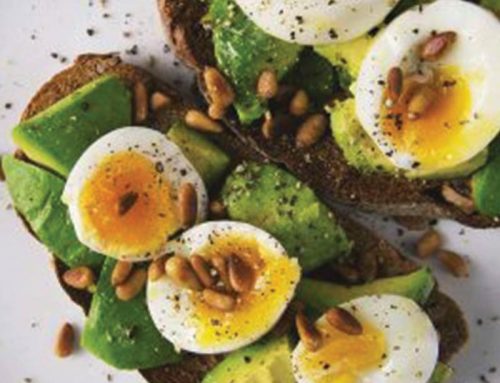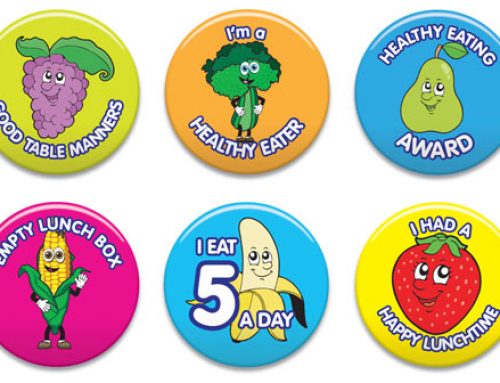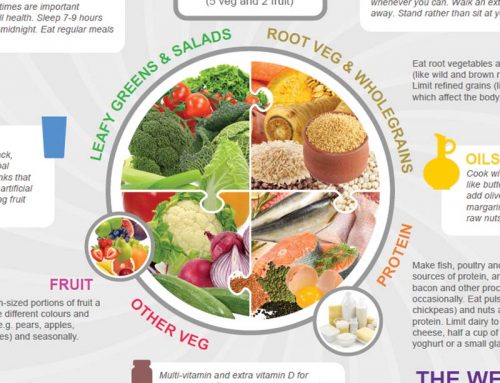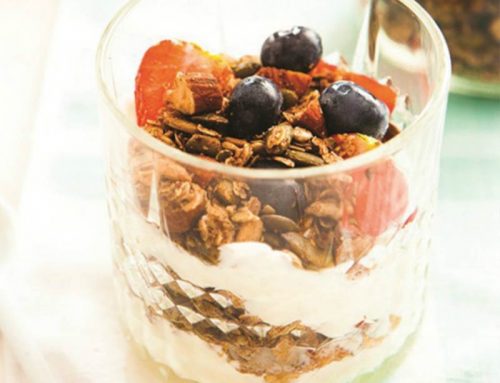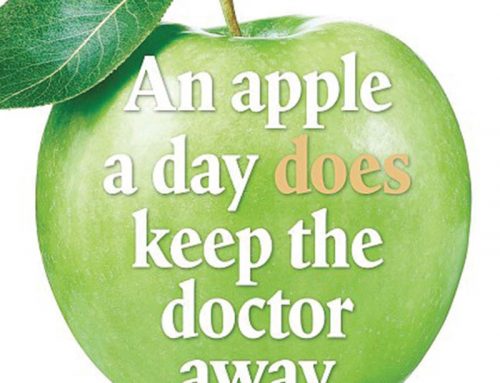 There’s no doubt that food can have a powerful effect on you health and wellbeing but certain foods pack far more nutritional punch than you may realise. So just how much do you know about the individual health boosting properties of the foods you eat?
There’s no doubt that food can have a powerful effect on you health and wellbeing but certain foods pack far more nutritional punch than you may realise. So just how much do you know about the individual health boosting properties of the foods you eat?
To test your nutritional smarts, simply take the quiz below and see how your food knowledge measures up! Good Luck!
1) To lower your cholesterol, munch on…
a)Carrots
b)Apples
c)Peppers
2) To boost your mood snack on…
a)Cottage cheese
b)Oranges
c)Celery
3) To reduce PMS bloating & water retention have some
a)Chocolate
b)Water melon
c)Peanut butter
4) To boost your memory go for
a)Corn
b)Natural Yogurt
c)Blueberries
5) If you’re stressed, eat more:
a)Cheese
b)Beans/Lentils
c)Ginger
6) How many portions of dairy a day is essential for healthy bones?
a)Three
b)Five
c)Zero
7) To reduce bloating and wind eat some:
a)Fennel
b)Basil
c)Parsley
8) Which spice helps to reduce sugar cravings?
a)Ginger
b)Tumeric
c)Cinnamon
9) Which food may lower your risk of developing heart disease?
a)Garlic
b)Monkfish
c)Turkey
10) How many teaspoons of sugar does the average pot of fruit yogurt contain?
a)1 teaspoon
b)2 teaspoons
c)4 teaspoons
ANSWERS
1) Answer: B There’s good reasoning behind the old saying ‘an apple a day keeps the doctor away’! One such reason is that eating apples regularly can help lower cholesterol levels. Just make sure to eat the skin as it’s the pectin in apple skins that binds to cholesterol and helps eliminate it from the body. As well as packing a delicious crunch, they’re also a good source of Vitamin C, potassium and dietary fibre.
2) Answer: A Cottage cheese is high in an amino acid called Tryptophan which is the main building block for serotonin production. Serotonin (also known as ‘the happy hormone’) works to help us feel calm and content. So eating foods high in tryptophan such as cottage cheese will boost serotonin levels particularly when eaten with a small amount of carbohydrate. So, the next time you’re feeling a bit blue, try a snack of cottage cheese on rice cakes for a tryptophan-loaded mood lift.
3) Answer: B Bloating and fluid retention is a common complaint among PMS sufferers. To alleviate this, the use of natural diuretics is often recommended. Not only will water melon satisfy a sweet craving, it’s a natural diuretic to boot! Its high water content helps to stimulate excretion of urine, thereby decreasing water retention. Also, watermelon is considered to be an excellent source of potassium and is high in vitamin B6 which is known to help alleviate mood swings – all in all the perfect PMS food!
4) Answer: C Often referred to as the ‘brain berry’, blueberries are packed full of memory boosting nutrients. They are also one of the richest sources of antioxidants which help protect our brains from free radical damage. In fact, more and more studies are suggesting that a daily dose of berries could even reduce a person’s risk of developing Alzheimer’s and dementia. So, feed your brain daily with a handful of these tasty blue marbles – throw them into the lunchbox for a nutritious snack or add them to yogurt or muesli for breakfast.
5)Answer: B Prolonged stress or anxiety literally drains and depletes vitamins and minerals from our bodies which is why it is so important to eat regularly and well in order to replenish these stores. Beans and lentils are an excellent source of magnesium and B vitamins which helps build the body’s ability to handle stress. Some options include; chick peas, butter beans, kidney beans and lentils. Soups and stews are a great way to get beans and lentils into the diet.
6) Answer: C The notion that dairy is absolutely ‘essential’ for healthy bones comes from outdated food pyramids and guidelines supplied by dairy boards. The fact is that whilst children and teenagers may benefit from consuming dairy (in moderation) for calcium, the majority of us adults do not. There are many other ways to keep our bones healthy, they include avoiding the ‘S’ words: smoking, stimulants, sugar, salt and stress which all leech calcium from the body. Good non dairy sources of calcium include tinned sardines, nuts, seeds, pulses and green leafy vegetables.
7) Answer: A Fennel is extremely effective for treating stomach bloating and helping to relieve wind. It contains a whole cocktail of essential oils that give its characteristic aniseed smell. Fennell works really well roasted in the oven with olive oil or you can drink fennel tea instead. Just add 1 teaspoon of whole fennel seeds to 1 pint of water. Boil the seed in a saucepan for 20 minutes and strain before drinking to eliminate the seeds
8) Answer: C Seasoning a high carbohydrate food with cinnamon can help lessen its impact on your blood sugar levels and thus reduce subsequent cravings for sugar. Cinnamon slows the rate at which the stomach empties after meals, reducing the rise in blood sugar after eating. This helps to control blood glucose levels by preventing insulin spikes after meals. Sprinkle this aromatic spice over porridge, yogurt, stewed apple or use in baking for added flavour and health benefits.
9) Answer: A Increasing evidence suggests that garlic may help prevent heart disease. It may slow down atherosclerosis (hardening of the arteries) and lower blood pressure slightly, between 7% and 8%. Garlic also seems to be an anticoagulant, meaning it acts as a blood-thinner, which could help prevent heart attacks and strokes. Chopping or crushing garlic activates the most powerful compound (allicin) and allowing it to sit for around 10 minutes before cooking will further maximise the health benefits.
10) Answer: C Most small pots of fruit yogurt on the market today contain approximately 4 teaspoons of sugar. Some of this will come from natural milk sugars, but the majority are added sugars. Sugar always comes under the heading of carbohydrates. Usually you will see something like ‘Carbohydrate 34g of which sugars 16g’. It is the sugar content that you should be concerned with. A simple way of gauging sugar content is to remember that 1 teaspoon is equivalent to 4grams. So, if your favourite fruit yogurt contains 16g of sugar per small pot, that’s equivalent to 4 teaspoons of sugar which is a lot!


